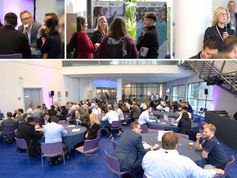Pathway to net zero: Emissions pledges of leading Food manufacturers
Here we outline the net-zero emission commitments of the globe's foremost food production companies, following the Greenhouse Gas Protocol's international standards. This categorises emissions into three 'scopes': direct emissions from owned sources (Scope 1), indirect emissions from purchased energy (Scope 2), and all other indirect emissions within a company's value chain (Scope 3), which notably represent the majority in a food manufacturer's carbon footprint.

Nestlé Nestlé, the largest food producer globally, announced its net-zero ambitions in 2020, aiming for zero greenhouse gas emissions by 2050. CEO Mark Schneider emphasised the initiative's ethical imperative and relevance to consumer expectations.
The company, whose emissions targets have been validated by the Science Based Targets initiative (SBTi), seeks a 20% emissions reduction by 2025 from its 2018 baseline, with a goal of a 50% reduction by 2030. Its strategy includes investments in regenerative agriculture, a commitment to recyclable or reusable packaging by 2025, and sourcing renewable energy across all operations by the same year.
As of its 2022 annual report, Nestlé reported a decrease in emissions from its 2018 levels. However, in 2023, Nestlé revised its strategy by ceasing the use of carbon offsets and retracting carbon neutrality claims for specific brands. Additionally, it engaged in efforts to reduce virgin plastic use and enhance the recyclability of its packaging.
PepsiCo PepsiCo's goals are to reduce its value chain's absolute greenhouse gas emissions by over 40% by 2030, including a 75% reduction in direct operations, with a net-zero target by 2040 from a 2015 baseline.
Despite increasing Scope 3 emissions, the company reported a general emissions rise in 2022 due to business growth. Initiatives include adopting regenerative agriculture practices and sourcing key ingredients sustainably.
Mondelez International Mondelez has committed to net-zero emissions by 2050 across its full value chain. Following science-based targets set in 2020, it aims to reduce emissions intensity significantly, supported by renewable energy and green fuel transitions in its operations.
Mars Mars updated its net-zero pledges in 2023, maintaining a 50% reduction target by 2030 from a 2015 baseline, despite facing challenges in achieving its preliminary goals.
The company is committed to reducing emissions across its full value chain to align with a 1.5°C global warming limit.
Danone Aiming for net-zero emissions by 2050, Danone has pursued aggressive carbon intensity reductions within its operations and across its value chain.
The company has set ambitious interim targets, with significant investments in sustainability initiatives aimed at reducing methane emissions and enhancing dairy farming practices.
Bel Group France's Bel Group has outlined ambitious plans to cut emissions by 25% by 2035, with a strong focus on reducing the carbon intensity of its production and transitioning to renewable energy sources.
The company's efforts include significant investments in sustainable agriculture and dairy production.
Friesland Campina The Dutch dairy major has set forth a comprehensive plan to achieve climate-neutral dairy production by 2050, with significant reductions in emissions across its operations and supply chain aimed at sustainability and energy efficiency.
General Mills With a commitment to net-zero emissions by 2050, General Mills is focusing on reducing its carbon footprint through energy efficiency, renewable energy sourcing, and sustainable farming practices, aiming for a 30% reduction by 2030.
JBS As a major player in the meat sector, JBS has pledged to achieve net-zero emissions by 2040, investing significantly in emission reduction projects and sustainable agriculture to address its substantial carbon footprint.






Comments